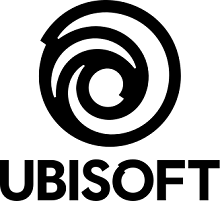Ubisoft
Ubisoft is the third-largest independent publisher of video games worldwide. Ubisoft Entertainment S.A's worldwide presence includes 29 studios in 19 countries. The company has subsidiaries in 26 countries. Ubisoft's largest development studio is Ubisoft Montreal in Canada, which employs about 2,100 people.
In Ubisoft's 2008–2009 fiscal year, the company’s revenue was €1.256 billion, reaching the 1 billion euro milestone for the first time in the company’s history. Ubisoft created its own film division, called Ubisoft Motion Pictures, which creates shows and films based on the company’s games.
History
In March 1986, five brothers of the Guillemot family founded a computer game publisher, Ubisoft, in Carentoir, a small village located in the Morbihan department of the Brittany region, in France. Yves Guillemot soon made deals with Electronic Arts, Sierra On-Line, and MicroProse to distribute their games in France. By the end of the decade, Ubisoft began expanding to other markets, including the United States, the United Kingdom, and Germany. They also entered the video game distribution and wholesale markets, and by 1993 they had become the largest distributor of video games in France. In the early 90s, Ubisoft initiated its in-house game development program, which led to the 1994 opening of a studio in Montreuil, France. It later became their administrative and commercial head office, even as the company continues to register its headquarters in Rennes. Ubisoft became a publicly traded company in 1996 and continued its expansion around the globe, opening locations in Annecy, Shanghai, Montreal and Milan.
In the late 1990s and early 2000s, Ubisoft committed itself to online games by supporting Uru: Ages Beyond Myst, The Matrix Online, and the European and Chinese operation of EverQuest. The publisher established an online division. However, in February 2004, Ubisoft cancelled the online portion of Uru and backed out of the publishing deal on The Matrix Online.
The company is noted for its teams of female game developers/testers, known as the Frag Dolls.
In March 2001, Gores Technology Group sold The Learning Company's entertainment division (which includes games originally published by Brøderbund, Mattel, Mindscape and Strategic Simulations, Inc.) to them. The sale included the rights to Intellectual properties such as the Myst and Prince of Persia series. In July 2006, Ubisoft bought the Driver franchise from Atari for a sum of €19 million (US$24 million) in cash for the franchise, technology rights, and most assets. In July 2008, Ubisoft made the acquisition of Hybride Technologies, a Montreal-based studio renowned for its expertise in the creation of visual effects for cinema, television and advertising. In November 2008, Ubisoft acquired Massive Entertainment from Activision. In January 2013, Ubisoft acquired South Park: The Stick of Truth from THQ for $3.265 million.
In December 2004, rival gaming corporation Electronic Arts purchased a 19.9% stake in the firm, an action Ubisoft referred to as "hostile" on EA's part.
Ubisoft announced plans in 2013 to invest $373 million into its Quebec operations over seven years, a move that will generate 500 additional jobs in the province.
The publisher is investing in the expansion of its motion capture technologies, and consolidating its online games operations and infrastructure in Montreal.
The significant investment is expected to generate 500 jobs in Quebec over a seven year period. By 2020, the company will employ more than 3,500 staff at its studios in Montreal and Quebec City.
PlayStation 2 Games developed by Ubisoft
Pro Rally 2002 PS2 March 28, 2002
Rayman Arena PS2 October 1, 2002
Petz: Catz 2 PS2 November 13, 2007
Donald Duck: Goin' Quackers PS2 December 14, 2000
Chessmaster PS2 June 2, 2003
Beyond Good & Evil PS2 November 11, 2003
Monster 4x4: Masters of Metal PS2 November 25, 2003
Tom Clancy's Ghost Recon: Jungle Storm PS2 March 23, 2004
This article has been almost entirely taken from Wikipedia
